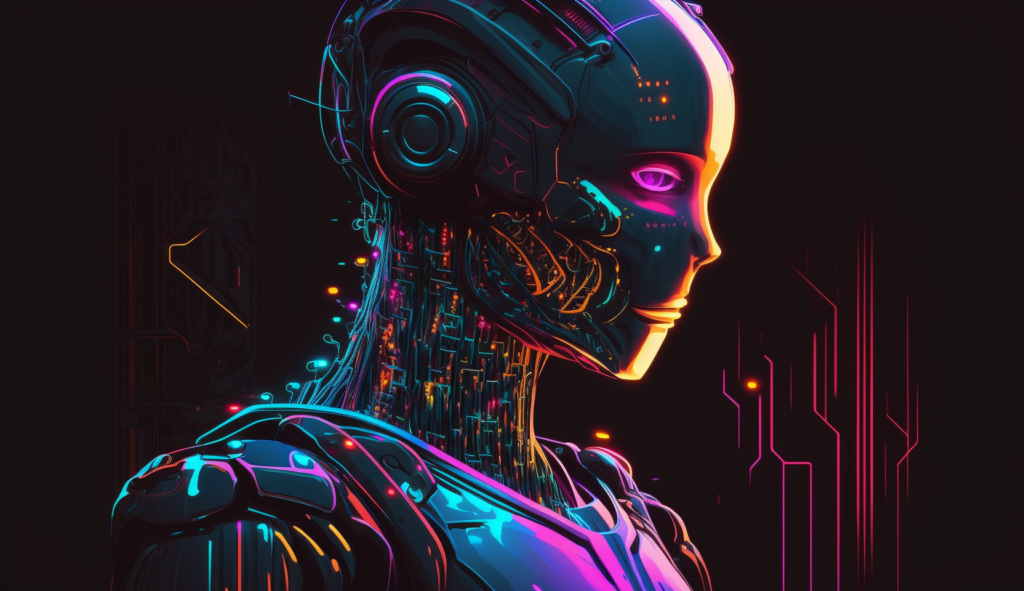As technology advances and more jobs are being filled by machines instead of people, it begs the question: Is there a risk that chatbots and artificial intelligence (AI) could replace your bank teller job? With many banks already using AI to automate customer service interactions, this possibility becomes increasingly likely. In this article, we will explore whether banking jobs are at risk of becoming obsolete due to advancements in AI and automation.
The idea of losing one’s job to robots can be frightening; however, understanding how technologies like chatbots and AI may impact our working lives is key to making informed decisions about our careers. This article offers an overview of the current state of automation in the bank teller profession, exploring both its potential benefits and detriments when compared to human labor. We also examine what role humans might still play within the industry going forward.

By the way, discover if bank tellers have made it onto the list of occupations most prone to AI disruption. Our study provides the details you’re looking for!
Definition Of Chatbots And AI
Chatbots and Artificial Intelligence (AI) are rapidly becoming more common in our everyday lives. With the advent of machine learning, natural language processing (NLP), and AI, chatbots have become an important part of many work fields. But what exactly is a chatbot? Simply put, it’s a computer program that simulates human conversations with real people through text or audio messages. It uses AI to understand user input and respond accordingly.
In contrast to traditional software programs, which rely on predetermined rules for handling requests, AI-based systems can learn from experience by recognizing patterns in data sets. This allows them to adapt their responses according to changing customer needs over time. Furthermore, NLP enables these systems to interpret natural language commands accurately and quickly produce results – something manual processes cannot do as efficiently or reliably.
With all this technology at play, there’s no denying that the use of chatbots and artificial intelligence holds tremendous potential for streamlining customer service operations across various sectors. They provide businesses with a cost-effective solution for dealing with simple queries while freeing staff up to focus on more complex tasks. The automated nature of such technologies also ensures customers receive fast responses without waiting times – offering them convenience as well as satisfaction. For banks specifically, using chatbots could help reduce operational costs while delivering superior services tailored to individual clients’ preferences and expectations.

Uses Of Automation In The Banking Sector
It’s like a robot revolution is taking over the banking sector. Automation has been slowly but surely creeping into our banks, quietly replacing traditional human labor with machines that can do the same job more efficiently and accurately. Banking automation has already reduced manual effort in many areas of banking services such as deposits, withdrawals, transfers, payments, and loan processing. This shift to automated banking has enabled financial institutions to reduce their costs while improving customer experience by offering faster service times and more accurate results.
Automated banking systems also help improve security for customers’ money and data. With ever-increasing cyber threats on personal information, it makes sense for banks to implement robust measures such as two-factor authentication or biometric identification procedures which demand less user input from customers yet provide more secure verification methods than traditional ones. These technologies have made online transactions much safer while allowing users to access their accounts without needing to visit the bank physically.
The use of robotics and AI are enabling further innovation in the banking sector by providing smarter ways of managing finances. From customized investment advice according to individual needs using robo advisors to intelligent chatbots being employed by banks as virtual assistants; these advances in technology are helping make life easier for both consumers and businesses alike whilst simultaneously driving efficiency within the industry itself.
Job Losses Due To Automation
The fear of job losses due to automation is a legitimate concern, particularly when it comes to banking. With the proliferation of chatbots and AI in banking, teller positions are at risk of being replaced by technology. Banks have begun experimenting with these technologies as part of their new customer service strategies, which could result in significant economic impacts for both employees and customers alike.
It’s important to consider the broader implications that technology deployment can have on our financial landscape – not just from an efficiency standpoint but also from a human perspective. Even if banks do maintain some number of teller positions, there may be fewer jobs available overall given the increased use of automated services. This could lead to more people competing for the same roles, resulting in wage stagnation or even cuts across many industries. In addition, automation banking might require extra training for existing staff members, meaning additional costs that cannot always be absorbed by budget-strapped businesses.
These concerns should not be taken lightly; they need to be addressed immediately before any real damage is done. Companies must find ways to ensure adequate employment opportunities for those facing potential job displacement while still meeting customer needs through technological advancements like chatbot and AI integrations. Ultimately, striking this balance will determine whether we see positive outcomes flowing down into society or further increases in inequality.

Reallocation Of Human Manpower
The automated future of banking is here, and the rise of Chatbots and AI can be seen as a tidal wave that threatens to wash away many bank teller jobs. However, this doesn’t mean that all hope must be lost for those employed in financial institutions. Just like a river carving its way through rock, it’s possible to take advantage of these changes to redirect human resources into new roles within the industry. Banks have an opportunity to redesign their employees’ roles and reallocate their skills so they may continue with their work while staying ahead of the curve.
Job retraining programs are essential for ensuring current bank staff remain productive members of society despite the changing climate. These initiatives can focus on teaching people more advanced digital skills or providing them with alternative paths such as customer service positions in other sectors. In doing so, banks can commit themselves to creating lasting opportunities for everyone involved – from executives down to entry-level workers – instead of relying solely on machines to handle transactions without any regard for job security or career development. By taking proactive steps now, organizations will be able to weather any stormy seas that come their way while continuing along a path towards success.

Impact On Customer Experience
The introduction of chatbots and AI has had a significant impact on customer experience in the banking sector. The automated service offered by these technologies have allowed customers to have access to their accounts without needing to wait for a bank teller, making the overall banking experience much faster and more efficient. This convenience is an attractive factor that leads to increased customer satisfaction with their banking services.
However, there are also drawbacks when it comes to relying solely on chatbot and AI technology as opposed to human bank tellers. Automated systems lack any kind of emotion or empathy towards customers’ needs, which can be problematic if customers need advice or support from someone who understands them better than a computer algorithm could ever do. Even though customer service bots may become increasingly sophisticated over time, they will never replace the personal touch provided by human employees – something that many people value highly in their banking experience. For this reason, it is likely that we will see both humans and machines working side-by-side at banks for years to come.

Role Of Human Interaction In Bank Teller Banking Services
When it comes to the banking services that bank tellers perform, there is no substitute for the human factor. The importance of human interaction in banking cannot be understated and has become increasingly evident with advancements in artificial intelligence (AI) technology. Customers expect a certain level of customer service from their bank and this can only be provided through face-to-face interactions between customers and staff. This allows banks to create a personalized experience for each individual customer instead of just providing generic automated services.
The idea of having an AI chatbot or voice assistant replace the role of a bank teller seems attractive on paper but would ultimately fall flat when put into practice. Bankers are highly trained professionals that provide excellent advice and guidance on financial matters. They also have years of expertise dealing with complex problems that require deep understanding, something which AI simply cannot replicate yet. Also, bankers build relationships with clients over time which leads to greater loyalty among customers – something that machines could never match up to due to its lack of emotion.
Overall, while technology may make some aspects of banking more efficient, nothing can truly replace the unique human experience that comes along with engaging in banking services at a physical branch location. Human interaction will likely remain integral part of the banking sector as long as there are people who need help navigating their finances and making informed decisions about their money.

Impact On Security And Fraud Prevention
With the introduction of chatbots and AI, banking security measures are now more like a game of chess – ever-evolving as technology advances. While automation in the banking sector promises convenience and efficiency, it also presents potential risks that could threaten customer accounts.
The interactivity between customers and machines has created an opportunity for fraudsters to exploit any weak spots left behind by banks in their security systems. Automated processes make it much easier for criminals to access confidential information – such as account numbers or passwords – without detection. Furthermore, there is a chance that these automated services may be vulnerable to hacking attempts from malicious actors.
To combat these threats, various new techniques have been implemented into both AI and chatbot security protocols. Banks use advanced algorithms to detect suspicious activity on customer accounts before any fraudulent transactions can occur. Additionally, many companies rely on encryption technologies to protect confidential data from being stolen or manipulated by third parties. With these enhanced fraud prevention tactics in place, customers can rest assured that their accounts will remain secure even with the implementation of automated solutions.

Economic Consequences Of Job Losses
The potential of chatbots and AI to replace bank teller jobs is a real risk. Automation job losses are becoming increasingly common, as technology advances and more jobs become vulnerable to automation or other forms of human labor displacement. The economic impact of this trend can be devastating on those who have been replaced by automation.
Job loss effects range from decreased income levels to increased unemployment rates, resulting in long-term financial repercussions for individuals and communities alike. Those who are able to find new employment opportunities may face lower wages than before, leading to reduced purchasing power within their local economies that could affect the community at large. In addition, with fewer people employed there is less money circulating through the economy leading to further declines in growth and development.
While it’s true that certain industries will benefit from automation job replacement, such as banking, retail and manufacturing; workers must also contend with the fact that the number of available jobs is decreasing due to technological advancements. This means fewer opportunities for skilled laborers seeking well-paying positions, creating an uncertain future where finding steady employment becomes difficult over time. It’s essential then that governments take proactive steps towards managing this shift in order to ensure its citizens remain prosperous while they transition into different lines of work.

Government Regulations And Policies Regarding AI
Governments across the world are faced with a delicate balancing act: finding ways to embrace and regulate artificial intelligence (AI) while protecting their citizens from AI-induced job displacement. The digital economy is becoming increasingly intertwined with our everyday lives, making it important for governments to implement policies that will ensure an equitable distribution of wealth in this new era.
- Establishing laws or regulations related to banking automation technology
- Setting up transparent rules and guidelines regarding AI policies
- Creating safety nets for workers displaced by technological advances
The introduction of government regulatory measures could potentially provide much needed stability and security, but at what cost? There must be careful consideration of how quickly these regulations can be implemented without stifling innovation or creating too much disruption in the marketplace. Weighing the pros and cons of implementing AI policies requires taking into account both short term economic gains as well as long term effects on people’s livelihoods. As more automated technologies become available, governments need to develop strategies that will allow them to balance progress with protection.
It is clear that there are no easy answers when it comes to the use of AI; however, we all have a responsibility to think carefully about its implications now so we can create a better future for ourselves and generations yet to come. With thoughtful policymaking and ethical decision-making, we can strive towards a society where everyone has access to meaningful work opportunities within a secure economic framework.

The Future Of Bank Teller Services With AI And Automation
As technology rapidly advances, so too does the banking industry. Automation and AI are quickly becoming essential tools for banks in order to provide customers with faster, more efficient services while also improving fraud prevention capabilities. Digital banking is now at the forefront of customer experience with features such as automated payment reminders and digital account monitoring that make it easier than ever before to manage accounts from anywhere.
The use of automation and AI has resulted in a reallocation of jobs within the banking sector. Although some traditional bank teller positions have been replaced by these technological advancements, many roles remain untouched – allowing for employees to be retrained and move into other areas such as data analytics or customer service. This shift towards digital banking will continue to bring new opportunities for both workers and businesses alike. Banks must stay ahead of the curve by using modern technologies in order to keep up with their competitors and ensure they’re providing the best possible experience for their customers.

Potential Benefits For Bank Tellers
The potential benefits for bank tellers are like a beacon of hope in an uncertain future. With the advent of chatbots and artificial intelligence, some may worry about their job security as a teller– but there is no need to despair. Banking automation can help improve efficiency and accuracy by freeing up time for more complex tasks that require human skills. It could also open up new opportunities within the financial sector, offering bank tellers greater career prospects than ever before.
As technology advances, it’s important to stay informed on current trends so you can adjust your approach when necessary. This will ensure that you remain competitive in today’s market while continuing to provide excellent customer service with every interaction. AI-based banking has been proven to benefit both customers and employees alike; if used correctly, it could save banks money while providing better services at lower costs. Ultimately, this means increased job security and opportunities for growth within the industry for all involved—bank tellers included!

Challenges Faced By Bank Tellers When Deploying Technology
Deploying technology such as chatbots and AI can be a daunting task for bank tellers. With the introduction of these new technologies, bank tellers must face a range of challenges associated with their deployment. One primary challenge is that deploying chatbots and AI requires an investment in both time and money, which may not always be available to bank tellers in smaller institutions. In addition, there is also the challenge of training staff on how to use this technology properly so that they are able to provide the best customer service possible.
Another significant challenge faced by bank tellers when deploying technology is that it creates uncertainty about job security. While some banks have embraced the use of AI, many still rely heavily on human interaction and decision-making skills when dealing with customers’ financial needs. As such, bank tellers may feel threatened by the prospect of being replaced by automation or having their roles diminished due to increased reliance on machines instead of people.
Bank tellers thus face several key challenges when considering the deployment of technology within their organizations. There are investments that need to be made in order to successfully implement these tools, as well as ongoing training needed for staff members who will interact with them on a daily basis. Furthermore, fear surrounding potential job loss or decline in job function can create additional stressors for those involved in implementing these systems into their workplaces.

The Prospects For Bank Tellers In A Digital Age
Recent studies suggest that nearly 1 in 4 bank tellers across the US could see their job roles replaced by automated technologies. In a digital age, where AI technology and chatbots are becoming increasingly prevalent within finance industries, many bank tellers are concerned about their future prospects. However, these automation opportunities bring with them new opportunities for those working in banking institutions. Banks now have more time to focus on customer service, such as offering advice and guidance to clients, while complex financial tasks can be completed faster and more accurately than ever before through the use of sophisticated algorithms.
Bank tellers will still play an important role in day-to-day operations; they’ll just need to adapt their skillset accordingly. For instance, some banks may require staff who can develop and maintain relationships with customers or ensure transactions run smoothly – both of which involve interpersonal skills that machines are yet to master. This means that despite advancements in AI technology, there is still plenty of scope for bank tellers to thrive in this digital age if they’re willing to embrace change and learn new skills.

Conclusion
The reality is that chatbots and AI are increasingly being used to replace the role of bank tellers. This could lead to job losses for many individuals in the banking sector, resulting in economic implications that must be addressed.
It is therefore important that government regulations and policies are put in place to protect those who may lose their jobs due to increased automation. We need measures which ensure customer safety and prevent fraud while at the same time maintaining a human element within digital services!
Author: Ole Paulson
Author Bio: I’m Ole and on this website, I share everything there is to know about Artificial Intelligence, and useful tips for using AI to our advantage. I have a background in data science and research and have been following the AI-space for years. You can read more about me in the “About” page.







